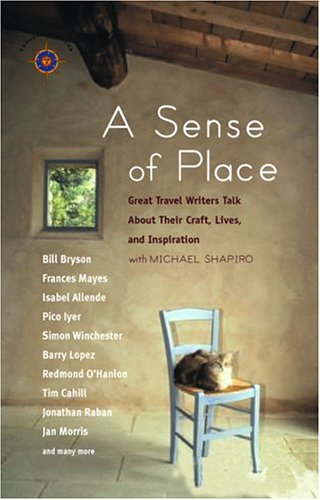A Sense of Place by Michael Shapiro
|
|
|
Review by Tim Leffel
Want to find out how some of the most successful travel writers in the world work, travel, and think? A Sense of Place sets out to make it happen in interviews with household names and less famous talents from the world of travel writing. Many go out of their way to call themselves anything but a "travel writer," which probably stems from selecting who is featured. All are book authors (who write almost as much fiction as non-fiction, collectively), and only a handful have recently written for travel magazines or newspapers.
With a title like A Sense of Place, Shapiro couldn't just phone in these interviews. Though the predictably cranky Paul Theroux answers his questions via email, for the others, Shapiro logged some serious frequent flyer miles visiting authors in their homes or where they sit down to write daily. He talks to Redmond O'Hanlon and Sarah Wheeler in England, Tom Miller in Arizona, Jan Morris in Wales, Frances Mayes in Italy, Peter Mathiessen on Long Island, Tim Cahill in Montana, and other dots on each side of the Atlantic. (Until I read this book, I never considered what a lock — some would say a duopoly — citizens from the U.S. and the U.K. have on the travel narrative genre.)
By its nature, a book like this will be uneven. Some writers are obviously better on paper than they are in interviews. Others can distill bits of wisdom into effortless answers, cranking out the quotes they constantly strive to get from the people they meet in their travels. Arthur Frommer's years as a radio host are evident in the crispness of his responses. When describing his stays at the top luxury hotels around the world, he says, "I regard them as one more crushing bore after the next." When Pico Iyer lays out why British boarding school is excellent training for being a travel writer, he makes the argument skillfully as a debate team captain. When Rick Steves, the level-headed guidebook publisher and PBS Television host, talks about how people should ideally travel, he comes across as a level-headed guy who would make a good TV host.
Except for Backpacker Nation founder Brad Newsham, these authors have all reached a point where they are making a comfortable living from their writing. It is gratifying to see almost all of them express pleasure and some thanks for reaching this point, with perhaps a bit of "pinch me" edge to it all. Bill Bryson states, "All I ever wanted to do was to be able to pay the bills through writing. I have no greater wish than that."
However, none of them have taken it for granted enough to slack off, even when, in the case of Jan Morris, hitting the age of 80. "I have a great life," comments Sara Wheeler, "but it is hard work." Through the interview with Simon Winchester, we find that some writers work 12-hour days, starting at 6 a.m., but at least in an interesting home office instead of a soulless cubicle.
By getting a feel for where they write, we get an intimate glimpse of how these authors put the words together when the trip ends. Redmond O'Hanlon's study is filled with bizarre bugs and creatures preserved in jars. We learn that Peter Matthiessen's office is a memento-packed building 60 yards from his house, with a Zen meditation studio further down the path. However, when it comes to writing and their lives, it's never about amateur concerns such as writer's block or a lack of ideas. The struggles they face are ones most any of us face: the struggle to balance work and family, the challenge of balancing home and away time, and the frustration of not having enough time to read all the great books out there.
Many writers are eager to talk politics, which could put off those on the far right. Like most people who have seen how the rest of the world lives, they are overwhelmingly sensitive, open-minded, and liberal. A few also bemoan the state of modern publishing. Simon Winchester, once the Asia-Pacific editor for Condé Nast Traveler, talks about how he seldom writes for magazines anymore because they mostly want to cover the boring places that are easy to get to (and are more likely to pull in ad dollars). Rick Steves and Arthur Frommer, two men who founded guidebook empires, fret about the sorry state of guidebook writing today — the by-the-numbers approach and lack of personality.
In the end, not much of the book is about the mechanics of getting things published and building up a track record, though Shapiro does his best to draw advice for new writers. Sarah Wheeler says about aspiring travel writers, "I'm often shocked at how little people read. You've got to read all the time." Jeff Greenwald adds that they should "take the craft of writing as seriously as they would take learning how to play the oboe." Tom Miller asks, "What makes your travel so different than anyone else's? People don't want to read for the tenth time about Antigua unless there's something startlingly new."
Bill Bryson offers a reality check and bats back the myth that finding success as a travel writer is nearly impossible. "All the time, I get letters from people asking, 'What's the secret?' like there's some magic. The secret is you pound a path to the top of the mountain. You don't just sort of levitate your way up."
Tim Leffel has contributed to a wide range of travel magazines and newspapers and is the author of The World’s Cheapest Destinations, a Better Life at Half the Price, and editor of Perceptive Travel. .
|
